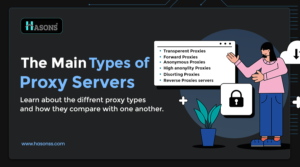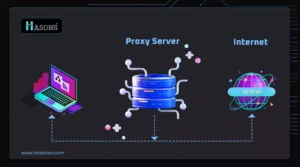What is a Proxy Server?
It is simply an intermediary between your computer and the internet, which processes your request to connect to a webpage or an online service. When you use a proxy server it forwards your request to the web server and also returns your request response from the server within a short interval. This process also assists in making sure that your IP address is completely masked to enhance your privacy while browsing on the internet. Also, Types of Proxy server can block sites, control the amount of traffic, and, store some info to facilitate the process of browsing the Internet. Various categories of proxies, anonymous, SSL, and rotating proxies exist depending on the need to ensure safety, speed, or unblocking.
Types of Proxy Servers
Have you ever thought about the possibilities of using a proxy server in the complicated field of Internet connections? Overall, proxy servers are essential to internet security, privacy, and anybody’s ability to access the desired content. In this blog, I will take a closer look at the different types so that you have a bit of an understanding of what they can do for you. Whether you are simply interested in the realm of tech and all the available technologies or are looking to secure your identity online, this guide aims to unveil various types of proxy servers. Let’s explore together!
Just as the literal meaning of the word implies, a proxy server is a type of server used in a computer network that acts on behalf of other clients.
A proxy server is a method of accessing the internet through a user’s device by directing his or her requests through a server. It is considered an intermediary component largely responsible for transmitting the request from the user to the internet as well as from the internet to the user.

Types of Proxy
Here are the different types of proxy server!
1. SSL Proxy
An SSL proxy, or an HTTPS proxy, sits between the user and the Internet and encrypts the user’s data transmission. This kind of proxy is frequently used for secured purposes like payment gateways and other confidential data transmissions.
2. Transparent Proxy
A transparent proxy intervenes, making some changes to the user requests, and is easily identifiable. It is often employed to set rules concerning Internet usage and control users’ IDIPs.
3. Rotating Proxy
Based on the above definitions, a rotating proxy is an IP tool that changes the IP address of the device of the user at a particular interval of time. This is particularly helpful in overcoming restrictions on websites and other content that is locked within specific regions.
4. Anonymous Proxy
An anonymous proxy conceals the user’s IP from the internet, which is the least an individual can secure while using the internet. Nevertheless, it may still submit some information to the Internet websites.
5. Distorting Proxy
A distorting proxy changes the user’s IP address and provides incorrect information to the websites, so it can be hard to determine the actual location of the user or his or her real identity.

6. High Anonymity Proxy
A high-anonymous proxy is the most secure and anonymous proxy since it does not reveal the user’s IP address at all. It does not submit any personal information to websites.
7. Public Proxy
A P2P proxy can be accessed by just anybody and is typically slower and less secure than an anonymous proxy. It is prevalent in web surfing and consuming unrestricted geographical content.
8. Forward Proxy
9. Shared Proxy
Many people connect to this server simultaneously, affecting the connection speed and reducing privacy for everyone. It is affordable for uses that do not consist of browsing the web.
10. Data Centre Proxy
A data center proxy is located on the servers within the data centers and provides speed and stability. It is also ideal in environments that demand high performance and durability.
11. Residential Proxy
A residential proxy uses IPs assigned to people by internet service providers. This type of proxy enables accurate mimicry of real user activity and their geographical location.
Conclusion
In conclusion, there are several types of proxy servers that are designed to meet the user’s requirements. The data center proxy, considered the fastest and most efficient, is the first type of proxy server. Thus, the best type of proxy server is relative to the user’s needs when it comes to anonymity level, speed, or security.
| If you are reading Types of Proxy Server then also check our other blogs: | |
| Computer Virus | First Electronic Computer |
Types of Proxy Server
- How many types of proxy servers are there?It should also be noted that there are various forms of proxy servers, and each of them has its own advantages and distinguishing characteristics.
- Which is the most common type of proxy server?The One of the most popular types of proxy servers is the data centre, known for its high performance.
- What type of proxy is best?Each user should define what kind of proxy server is most suitable for his or her needs: anonymity level, speed, and security.
- Is a VPN a type of proxy server?Although VPNs and proxy servers share similarities in rerouting internet traffic, they serve different purposes. While a proxy server acts as an intermediary between a user and the internet, redirecting requests for improved performance or anonymity, a VPN creates an encrypted tunnel to secure all online activities.
